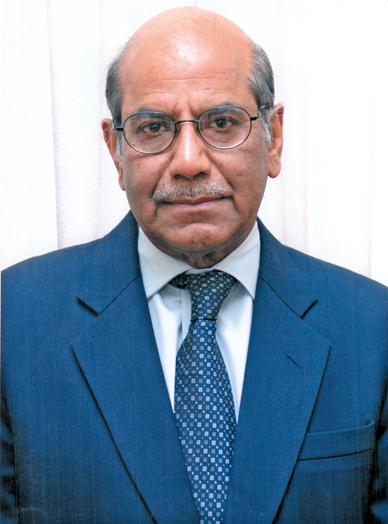|
 According to Shyam Saran,
Chairman of the National Security Advisory Board (NSAB), “a limited nuclear war is a contradiction in terms” and that,
“any nuclear exchange, once initiated, would swiftly and inexorably escalate to the strategic level.” According to Shyam Saran,
Chairman of the National Security Advisory Board (NSAB), “a limited nuclear war is a contradiction in terms” and that,
“any nuclear exchange, once initiated, would swiftly and inexorably escalate to the strategic level.”
“The label on a nuclear weapon used for attacking India, strategic or tactical, is irrelevant from the Indian perspective.”
While pointing out that what he was saying was in his personal capacity and based on his understanding of the events in
the past, he observed: “India does have a credible theory of how its nuclear weapons may be used and that is spelt out in
its nuclear doctrine.”
He said India supported global nuclear disarmament but till that happens, it will maintain “a robust nuclear deterrent
in the meantime.” He also mentioned that India has always followed “a cautious and restrained approach.”
Significantly, last year India had expressed its desire to join the Nuclear Suppliers Group (NSG) and the Missile
Technology Control Regime (MTCR), signalling the country’s strategic maturity. Saran reiterated this.
In a reference to Pakistan’s aggressive nuclear buildup he mentioned, “There is no moral equivalence in this respect
between the two countries and this point must be driven home every time Pakistan claims parity. We should not allow such
an insidious campaign to affect our proposed membership of the NSG (Nuclear Suppliers Group) and the MTCR (Missile Technology
Control Regime)”.
Saran said, “The above background must be kept in mind when evaluating India’s continued insistence on the central tenet
of its nuclear doctrine i.e., that India will not be the first to use nuclear weapons, but that if it is attacked with such
weapons, it would engage in nuclear retaliation which will be massive and designed to inflict unacceptable damage on the adversary.”
This is the first time actually that the difference between a tactical or strategic nuclear attack has been blunted as intolerable.
The distinguished diplomat pointed out that India’s nuclear deterrent is based on a credible nuclear doctrine and is
sustained by a “systematic drive to operationalise” its various delivery components, including a sea-based one by 2015-16. He termed
the development of the “third leg of the triad which is submarine based” as “work in progress”.
He also observed that India needed at least three nuclear-powered, nuclear-armed (SSBN) submarines like the Arihant,
which India is in the process of building.
Referring to deployment of theatre nuclear weapons by Pakistan, some of whose political, military and some terror leaders
have also threatened to use nuclear weapons, Saran observed: “Pakistan would be prudent not to assume otherwise as it
sometimes appears to do, most recently by developing and perhaps deploying theatre nuclear weapons.
“It would be far better for Pakistan to finally and irreversibly abandon the long-standing policy of using cross-border
terrorism as an instrument of state policy and pursue nuclear and conventional confidence building measures with India
which are already on the bilateral agenda. An agreement on no first use (NFU) of nuclear weapons would be a notable
measure following up on the commitment already made by the two countries to maintain a moratorium on nuclear testing.”
Countering critics of India’s nuclear weapons programme that it was driven by notions of prestige rather than considerations
of national security, Saran said India’s nuclear doctrine is based on the current geopolitical environment, especially with Pakistan
actively building up its nuclear arsenal and keeping its aggressive actions and strategies against India in mind.
He said India’s nuclear doctrine, which was formally adopted at a meeting of the Cabinet Committee on Security (CCS) on January 4,
2003, and the regular checks that are held have strengthened the level of confidence in India’s nuclear deterrent.
He said since the May 1998 nuclear tests, India has demonstrated “quite clearly a sustained and systematic drive to operationalise
the various components of the nuclear deterrent in a manner best suited to India’s security environment. This is not the record of a
state which considers nuclear weapons an instrument of national pride and propaganda”.
He said Pakistan has given the excuse of the Indo-US civil nuclear deal as the reason for the “relentless build up of its nuclear
arsenal”, its refusal to allow the Conference on Disarmament in Geneva to undertake multilateral negotiations on a Fissile Material
Cut-Off Treaty (FMCT) as well as its threat to deploy theatre nuclear weapons to meet a so-called conventional Indian armed thrust
across the border.
“The votaries of non-proliferation in the West have criticised the Indo-US civil nuclear agreement as having allowed
exceptionalism in favour of India, which has encouraged a nuclear arms race between India and Pakistan,” Saran said.
The exception provided to India in clinching the deal “rests on India’s universally acknowledged and exceptional record as a
responsible nuclear state as contrasted with Pakistan’s equally exceptional record as a source of serial proliferation and in
possession of a nuclear programme born in deceit and deception”.
“There is no moral equivalence in this respect between the two countries and this point must be driven home every time Pakistan
claims parity. We should not allow such an insidious campaign to affect our proposed membership of the NSG (Nuclear Suppliers Group)
and the MTCR (Missile Technology Control Regime)”, he concluded.
|